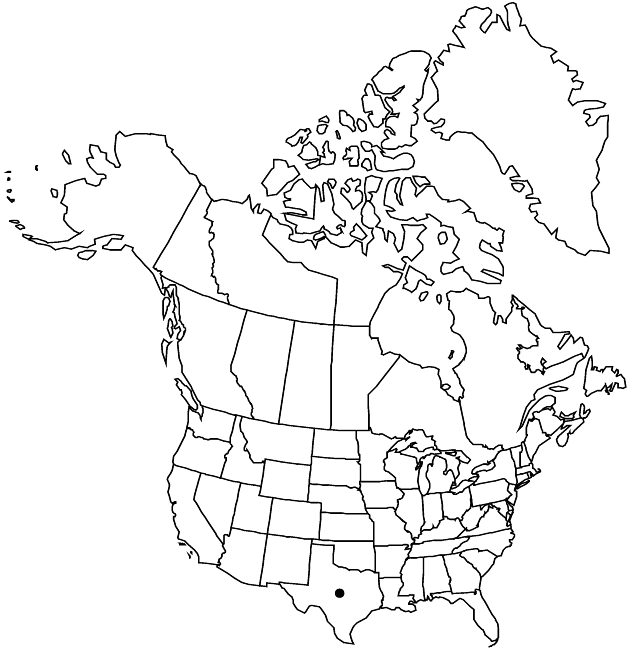Difference between revisions of "Gaillardia amblyodon"
Ann. Sci. Nat., Bot., sér. 2, 12: 62. 1839.
FNA>Volume Importer |
imported>Volume Importer |
||
| (6 intermediate revisions by 2 users not shown) | |||
| Line 6: | Line 6: | ||
|place=2, 12: 62. 1839 | |place=2, 12: 62. 1839 | ||
|year=1839 | |year=1839 | ||
| + | }} | ||
| + | |special_status={{Treatment/ID/Special_status | ||
| + | |code=E | ||
| + | |label=Endemic | ||
}} | }} | ||
|basionyms= | |basionyms= | ||
| Line 23: | Line 27: | ||
|elevation=10–100+ m | |elevation=10–100+ m | ||
|distribution=Tex. | |distribution=Tex. | ||
| − | |discussion=<p>Gaillardia amblyodon may prove to be not distinct from G. pulchella at species rank.</p> | + | |discussion=<p><i>Gaillardia amblyodon</i> may prove to be not distinct from <i>G. pulchella</i> at species rank.</p> |
|tables= | |tables= | ||
|references= | |references= | ||
| Line 32: | Line 36: | ||
-->{{#Taxon: | -->{{#Taxon: | ||
name=Gaillardia amblyodon | name=Gaillardia amblyodon | ||
| − | |||
|authority=Gay | |authority=Gay | ||
|rank=species | |rank=species | ||
| Line 46: | Line 49: | ||
|publication title=Ann. Sci. Nat., Bot., sér. | |publication title=Ann. Sci. Nat., Bot., sér. | ||
|publication year=1839 | |publication year=1839 | ||
| − | |special status= | + | |special status=Endemic |
| − | |source xml=https:// | + | |source xml=https://bitbucket.org/aafc-mbb/fna-data-curation/src/2e0870ddd59836b60bcf96646a41e87ea5a5943a/coarse_grained_fna_xml/V19-20-21/V21_1062.xml |
|tribe=Asteraceae tribe Heliantheae | |tribe=Asteraceae tribe Heliantheae | ||
|subtribe=Asteraceae (tribe Heliantheae) subtribe Gaillardiinae | |subtribe=Asteraceae (tribe Heliantheae) subtribe Gaillardiinae | ||
Latest revision as of 20:07, 5 November 2020
Annuals, 20–45+ cm. Leaves cauline; petiolar bases 0–3+ cm; blades oblanceolate, oblong, or spatulate, 2–6 cm × 6–24 mm, (bases of distal ± clasping) margins usually entire or obscurely toothed, rarely lobed, faces scabrellous and/or ± villous (hairs scattered, jointed). Peduncles 5–10(–15) cm. Phyllaries 22–32, lanceolate to lance-attenuate, 7–15 mm, ciliate with jointed hairs. Receptacular setae 2.5–3 mm. Ray florets 8–12; corollas mostly bright red to dark purple, rarely yellow, 15–25 mm. Disc florets 30–60+; corollas yellow with purple tips, tubes 1.5 mm, throats narrowly cylindric, 4.5 mm, lobes ovate-deltate, 0.5–1 mm, jointed hairs more than 0.3 mm. Cypselae dimorphic: the peripheral usually ± obcompressed-clavate, 2–4+ mm, glabrous or nearly so, with pappi of (6–)8+, muticous scales 0.1–0.3+ mm; the inner obpyramidal, 2–3 mm, hairs 1–3 mm, inserted at bases and on angles, with pappi of 8–12 lanceolate, aristate scales 5–6 mm (scarious bases 2.5–3 × 0.5–1 mm). 2n = 34.
Phenology: Flowering Apr–Jul.
Habitat: Open places on sandy soils
Elevation: 10–100+ m
Discussion
Gaillardia amblyodon may prove to be not distinct from G. pulchella at species rank.
Selected References
None.
